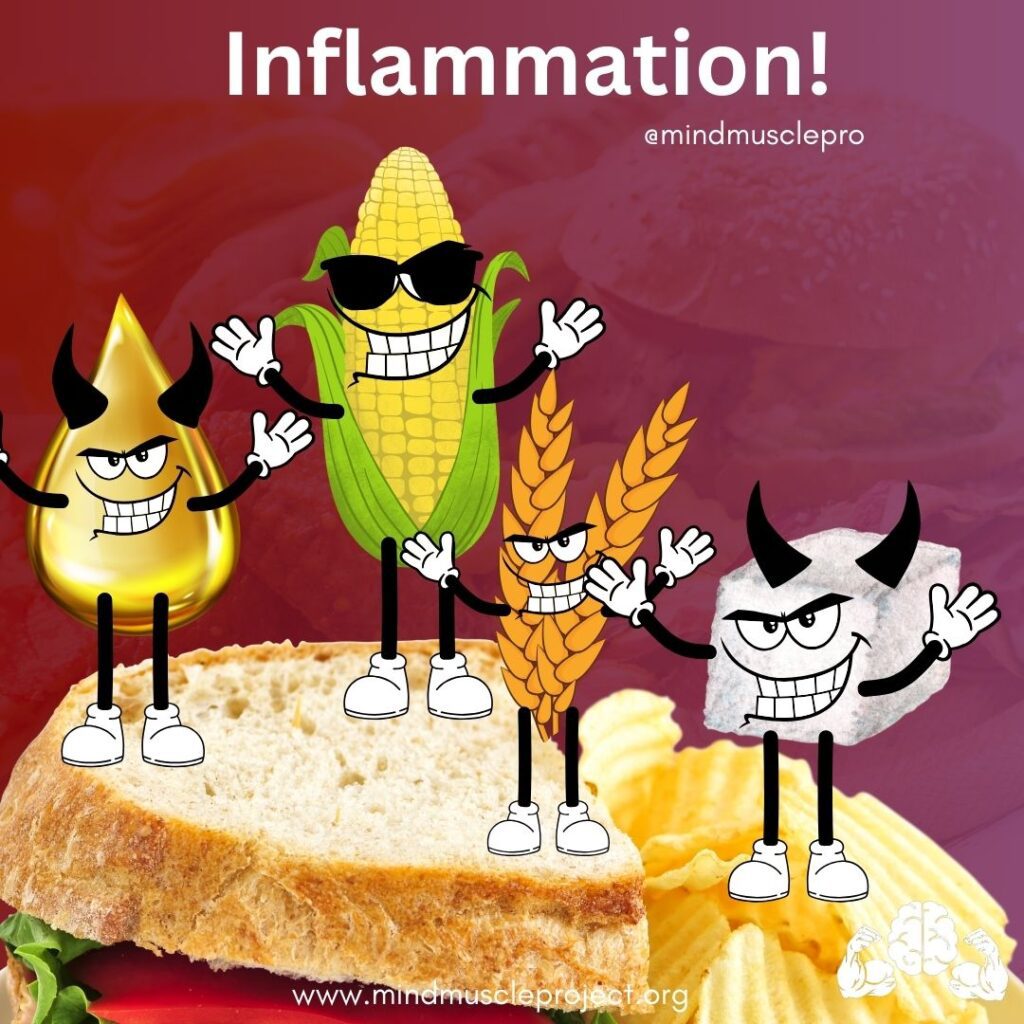Inflammation begins with what we put on our plates. While some foods help reduce inflammation, others can silently fuel it, leading to chronic health issues over time. Identifying and minimizing these pro-inflammatory foods is the first step toward a healthier, balanced lifestyle.
Major Food Culprits Behind Inflammation #
1. Fried Foods #
- High-heat cooking, like deep frying, produces Advanced Glycation End Products (AGEs), compounds that trigger inflammation.
- Deep frying in refined oils amplifies the inflammatory response.
- Tip: If deep frying is necessary, use saturated fats like ghee or coconut oil for better stability.
2. Sugar #
- Sugar promotes inflammation by:
- Driving insulin resistance
- Causing gut dysbiosis
- Accelerating glycation processes in the body
- Tip: Avoid added sugars and opt for a mostly sugar-free diet.
3. Refined Flour #
- Like sugar, refined carbohydrates cause rapid blood sugar spikes, leading to an inflammatory cascade.
- Tip: Replace refined flours with whole, unprocessed carbohydrates for better health outcomes.
4. Refined Oils #
- Common seed oils (e.g., sunflower, soybean, canola) are high in omega-6 fatty acids, which promote inflammation when consumed excessively.
- Heating these oils produces toxic substances like 4-HNE, damaging cells.
- Tip: Use cold-pressed oils (e.g., olive, avocado) or animal fats instead.
5. Wheat and Gluten #
- Proteins like gliadin and gluten in wheat are hard to digest for many people, causing inflammation.
- Even without celiac disease, Non-Celiac Gluten Sensitivity (NCGS) affects a significant population.
- Tip: Limit wheat and gluten intake, especially if inflammation is a concern.
6. Corn #
- While not inherently bad, corn can trigger inflammation in some individuals.
- Exposure to herbicides and other chemicals used in cultivation can add to the problem.
- Tip: If consuming corn regularly, reduce intake and opt for organic varieties.
7. Soy #
- Soy contains antinutrients and hormone disruptors, which can interfere with digestion and metabolic health.
- Processed soy products are particularly inflammatory.
- Tip: Limit soy consumption and focus on occasional, unprocessed forms.
8. Dairy #
- For many adults, lactose intolerance or sensitivity to A1 casein protein can cause inflammation.
- This is particularly true for individuals with autoimmune or severe inflammatory conditions.
- Tip: Evaluate your tolerance and consider reducing dairy if inflammation is persistent.
9. Processed Meats #
- While fresh meat is anti-inflammatory, processed varieties often include harmful additives like:
- Refined oils
- Soy-based extenders
- Preservatives
- Tip: Stick to high-quality, minimally processed meat options.
Other Potentially Inflammatory Foods #
While some foods, such as seed oils and sugar, are universally inflammatory, others depend on individual sensitivity. Examples include:
- Nightshade vegetables (e.g., tomatoes, eggplants)
- Nuts and leafy greens in large quantities
- Artificial sweeteners and certain condiments
- Specific beverages, such as sugary drinks or alcohol
Takeaway #
Not every inflammatory food needs to be completely eliminated for everyone. Factors like individual tolerance, overall diet, and lifestyle play significant roles in determining their impact.
Practical Tips: #
- Identify your personal triggers by observing how you feel after consuming certain foods.
- Focus on whole, minimally processed foods to keep inflammation at bay.
- Minimize highly inflammatory staples like refined oils, sugar, and processed items.
A mindful diet can pave the way for reduced inflammation and better health, one meal at a time.





